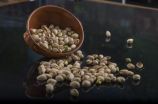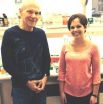(Press-News.org) The nature of the machinery responsible for the entry of proteins into cell membranes has been unravelled by scientists, who hope the breakthrough could ultimately be exploited for the design of new anti-bacterial drugs.
Groups of researchers from the University of Bristol and the European Molecular Biology Laboratory (EMBL) used new genetic engineering technologies to reconstruct and isolate the cell's protein trafficking machinery.
Its analysis has shed new light on a process which had previously been a mystery for molecular biologists.
The findings, published today [17 February] in the Proceedings of the National Academy of Sciences (PNAS), could also have applications for synthetic biology - an emerging field of science and technology, for the development of novel membrane proteins with useful activities.
Proteins are the building blocks of all life and are essential for the growth of cells and tissue repair. The proteins in the membrane typically help the cell interact with its environment and conserve energy.
Researchers were able to identify the 'holo-translocon' as the machinery which inserts proteins into the membrane. It is a large membrane protein complex and is uniquely capable of both protein-secretion and membrane-insertion.
Professor Ian Collinson, from the School of Biochemistry at Bristol University said: "These findings are important as they address outstanding questions in one of the central pillars of biology, a process essential in every cell in every organism. Having unravelled how this vital holo-translocon works, we're now in a position to look at its components to see if they can help in the design or screening for new anti-bacterial drugs."
The discovery is a result of an international collaboration between the University of Bristol team and Drs Christiane Schaffitzel and Imre Berger of the European Molecular Biology Laboratory (EMBL) outstation in Grenoble, France.
INFORMATION:
The work was funded in Bristol by the Biological Sciences Research Council (BBSRC) through a project grant and a doctoral training programme.
Paper:
'Membrane protein insertion and proton-motiveforce-dependent secretion through the bacterial holo-translocon SecYEG–SecDF–YajC–YidC' by R. Schulze, J. Komar, M. Botte, W. Allen, S. Whitehouse, V. Gold, J. Lycklama a Nijeholt, K. Huard, I. Berger, C. Schaffitzel and I. Collinson in PNAS.
Further information
The Biotechnology and Biological Sciences Research Council (BBSRC) invests in world-class bioscience research and training on behalf of the UK public. Our aim is to further scientific knowledge, to promote economic growth, wealth and job creation and to improve quality of life in the UK and beyond.
Funded by Government, and with an annual budget of around £467M (2012-2013), we support research and training in universities and strategically funded institutes. BBSRC research and the people we fund are helping society to meet major challenges, including food security, green energy and healthier, longer lives. Our investments underpin important UK economic sectors, such as farming, food, industrial biotechnology and pharmaceuticals.
For more information about BBSRC, our science and our impact see: http://www.bbsrc.ac.uk
Issued by Philippa Walker, Press Officer at the University of Bristol, on 0117 9288086 or Philippa.walker@bristol.ac.uk
Molecular biology mystery unravelled
2014-02-18
ELSE PRESS RELEASES FROM THIS DATE:
Personality and spaces, remaking love, meaning in life, and commonsense morality
2014-02-18
People and spaces, the tragedy of commonsense morality, myths about meaning of life, and remaking love were four themes at the Society for Personality and Social Psychology (SPSP) conference in Austin. Researchers presented new work, showing how psychology reaches into our everyday lives. Video from four of these talks is now available online.
Highlights include:
Sam Gosling of the University of Texas-Austin described how the link between our emotions and spaces is is inseparable. As such, our spaces say a lot about us. In new work, Gosling and colleagues identified ...
One-quarter of high risk patients denied anticoagulation after AF ablation
2014-02-18
Sophia Antipolis, 18 February 2014: One-quarter of high risk patients do not receive anticoagulants after ablation of atrial fibrillation (AF), according to the latest survey of European practice.
The EORP Atrial Fibrillation Ablation Pilot Study, conducted by the European Heart Rhythm Association (EHRA) of the European Society of Cardiology (ESC), reveals that 65% of patients were taking anticoagulants one year after ablation of AF.1 But up to 25% of patients at high risk of stroke (defined as a CHA2DS2-VASc score >1) were not taking any anticoagulant drug. And around ...
A new system accelerates verification of printed electronic documents
2014-02-18
This news release is available in Spanish. Researchers at the Universidad Carlos III in Madrid have designed a system that speeds up online administrative procedures by automatically verifying and validating printed electronic documents, a process that had been done manually up until now.
With the law known as Ley 11/2007, regarding citizens' electronic access to public services, going into effect, electronic documents have gained full legal validity. When a document of this type is printed out, it must be accompanied by its Código Seguro de Verificación (CSV- Secure ...
Parents are not more likely to split up if mothers earn more than fathers
2014-02-18
Couples with young children are as likely to stay together if the mother is the main breadwinner rather than the father, new research shows.
A paper published in the journal Sociology today [Tuesday 18 February 2014] says the relationships of parents are in some cases more stable if the mother earns more than the father.
Dr Shireen Kanji, of the University of Leicester School of Management, and Dr Pia Schober, of the German Institute for Economic Research, Berlin, examined survey data on 3,944 British couples as their first child aged from eight months to seven years. ...
Food & moods
2014-02-18
Emotional eating is something we're all familiar with. Maybe you had had a rough week at work and all you want on Friday night is to plop down and watch a movie with a giant bowl of buttery popcorn. Maybe you're a student stressed about a big exam and you're munching on candy as you study. Or maybe your child's birthday party is coming up and you've bought an ice cream cake to serve a small army to celebrate. Happy or sad, up or down, there's a plethora of media in the world that tells us our moods often dictate the foods we choose to eat.
More recent studies, though, ...
New treatment proposed to prevent intestinal inflammation in cancer patients
2014-02-18
Jerusalem, Feb. 18, 2014 – Experimental work pointing to a therapy for alleviating mucositis -- a common, severe side effect of chemotherapy and irradiation of cancer patients or patients prepared for bone marrow transplantation – has been achieved by an international team of researchers from the US and Israel headed by scientists at the Hebrew University of Jerusalem.
Mucositis is a strong inflammatory reaction of the mucosal lining of the digestive system, particularly the gut. Mucositis is often a major reason for premature suspension of anti-cancer therapy. As ...
Increase in Arctic cyclones is linked to climate change, new study shows
2014-02-18
Winter in the Arctic is not only cold and dark, it is also storm season when hurricane-like cyclones traverse the northern waters from Iceland to Alaska. These cyclones are characterized by strong localized drops in sea level pressure, and as Arctic-wide decreases in sea level pressure are one of the expected results of climate change, this could increase extreme Arctic cyclone activity, including powerful storms in the spring and fall.
A new study in Geophysical Research Letters uses historical climate model simulations to demonstrate that there has been an Arctic-wide ...
Saving Sochi's slopes: How artificial snow is made
2014-02-18
WASHINGTON, Feb. 18, 2014 — In what may be the warmest Winter Olympics on record, Sochi looks more like SoCal by the day. With few real snowflakes around to blanket Sochi's slopes, the latest episode of the American Chemical Society's Reactions YouTube series explains how science keeps the Winter Olympics alive with artificial snow. The video is available at http://youtu.be/ftMFMlk6FlA.
Producing artificial snow isn't as simple as grinding up big blocks of ice and spraying it on the slopes. Sochi's artificial snow guns — cannons that fire fake snow 20 to 30 feet in ...
Workers, get up and move
2014-02-18
Are you active at your job? If you're like most workers, you probably aren't. And the consequences could be deadly.
A team of researchers at the University of Iowa measured physical activity in police, whose jobs are presumably predicated on movement. Yet the group found that police officers burn as much energy on the job as someone sitting while holding a baby or washing dishes.
"We find that police work is primarily sedentary," explains Sandra Ramey, assistant professor in the UI College of Nursing. "The public view, how the media portray it on shows like 'Hawaii ...
When a black hole shreds a star, a bright flare tells the story
2014-02-18
Enrico Ramirez-Ruiz uses computer simulations to explore the universe's most violent events, so when the first detailed observations of a star being ripped apart by a black hole were reported in 2012 (Gezari et al., Nature), he was eager to compare the data with his simulations. He was also highly skeptical of one of the published conclusions: that the disrupted star was a rare helium star.
"I was sure it was a normal hydrogen star and we were just not understanding what's going on," said Ramirez-Ruiz, a professor of astronomy and astrophysics at the University of California, ...



